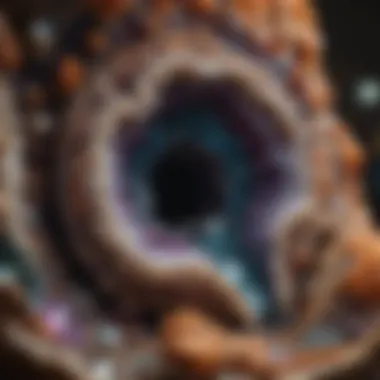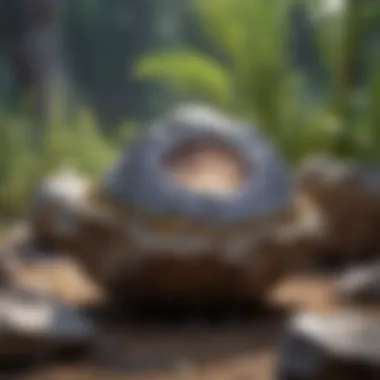Selling Geodes: Your Ultimate Selling Guide


Intro
Selling geodes presents a unique avenue into the world of mineral collecting. As both captivating natural formations and desirable collectibles, geodes attract collectors and enthusiasts alike. They are valued not only for their beauty but also for their geological significance. Understanding the market, recognizing what makes a geode special, and knowing how to sell effectively are essential skills for prospective sellers.
History and Origins
The allure of geodes is steeped in history. From ancient civilizations to modern collectors, these geological wonders have left a mark on human culture.
Overview of Collectibles, Rocks, and Fossils
Collectibles like geodes, rocks, and fossils possess an innate charm that captivates humanity. Geodes are hollow rock formations filled with crystals, often formed in volcanic or sedimentary processes. Their magical appearance makes them perfect for display and collection.
Historically, cultures have revered certain rocks and minerals for their beauty and presumed powers. Geodes, with their hidden treasures, often symbolize mystery and discovery, appealing to both collectors and casual enthusiasts.
Historical Significance and Cultural Impact
The fascination with geodes transcends geographical boundaries, influencing various cultures. For example, in America, Native Americans utilized certain minerals for both practical uses and spiritual significance. In European history, various societies have regarded crystals as sources of healing and protection. This cultural reverence contributes to the ongoing interest in collecting and selling geodes.
Identification and Classification
Identifying and classifying geodes is paramount for effective selling. Understanding the different types can enhance the seller's ability to market their items.
Guide to Identifying Rocks and Fossils
When starting with geodes, knowing how to identify them is crucial. A straightforward approach includes:
- Visual Examination: Look for exterior features. Smooth, rounded shapes often indicate geode formation.
- Weight Assessment: Geodes can feel heavier than a standard rock due to crystal formation inside.
- Sound Test: Tapping a geode can produce a ringing sound, suggesting hollow spaces within.
- Cutting Open: For serious sellers, cutting open a geode reveals its contents and assists in classification.
Common Types and Variations
There are several common types of geodes that potential sellers should be aware of:
- Quartz Geodes: Among the most popular, often displaying beautiful quartz crystals.
- Amethyst Geodes: Valued for their stunning purple color, these geodes are a favorite among collectors.
- Calcite Geodes: Less common but visually striking, showcasing the crystalline structure of calcite.
- Agate Geodes: These often feature banding and vivid colors, appealing to a broader audience.
Recognizing these variations can aid in effective marketing and help sellers target specific buyer preferences.
"Understanding the geology behind geodes can illuminate the path to successful selling. Knowing your product is key to enviable sales."
Prelims to Geodes
Understanding geodes is crucial for anyone interested in entering the market of selling these unique geological formations. Geodes, which are hollow rock cavities lined with crystals, hold significant appeal for collectors, hobbyists, and even casual buyers. They not only capture a specific type of geological intrigue but also present valuable opportunities for profit.
Knowing the basics can enhance your ability to connect with potential customers. This includes understanding both the aesthetic and practical value of geodes. Collectors often seek out geodes based on their physical characteristics, such as size, shape, and the type of crystals within. Therefore, equipping yourself with in-depth knowledge not only helps in sourcing and selling but also builds trust with your audience.
Moreover, the geological formation of geodes is a fascinating topic on its own. The creation process involves mineral deposits forming over millions of years, which adds depth and context to each piece you sell. Recognizing this can allow you to position your products effectively, tapping into the emotional and intellectual interests of collectors.
Defining Geodes
Geodes are spherical or oblong rock formations that typically contain crystal-lined interiors. The outer shell may appear unremarkable, but inside lies a hidden beauty that captivates many. The most common minerals found inside include quartz, amethyst, and calcite, each contributing to the allure of these natural wonders.
Their unique structure and the stunning crystals that form within make them highly sought after by collectors. A successful seller must be well-versed in what sets a geode apart, both in terms of physical characteristics and market demand. Understanding these definitions will help potential sellers in discussing their products and answering customer inquiries effectively.
The Geological Formation of Geodes
The formation of geodes begins deep within volcanic or sedimentary rock. Over time, mineral-rich water seeps into hollow spaces, where it slowly evaporates. This process allows minerals to crystallize, creating the beautiful formations found inside.
- Key Points of Geode Formation:
- Formation takes millions of years.
- Involves crystallization from mineral deposits.
- Common environments include volcanic rocks and sedimentary deposits.
Often, collectors are intrigued not solely by the final appearance but by the journey each geode has taken to reach its current state. Understanding the geological nuances not only enhances your storytelling when selling but also aids in identifying the geodes’ origin, which can influence their market value.
"The value of a geode often lies not just in its appearance but in the story it tells through its geological history."
Identifying Geode Types
Identifying geode types is crucial for sellers in the geode market. It allows them to classify their inventory, providing insights into what varieties are in demand. Knowing different types can enhance the ability to connect buyers with specific preferences while leading to more informed pricing strategies. Furthermore, understanding these types can bolster marketing efforts by emphasizing unique characteristics.
Common Geode Varieties
There are several common geode varieties that sellers should familiarize themselves with. Each type has distinct features that can appeal to different buyer segments. Here are a few notable varieties:
- Quartz Geodes: These are perhaps the most recognized type. The interior contains crystalline structures of quartz, which can be visually stunning.
- Amethyst Geodes: Special due to their purple crystals, amethyst geodes are highly sought after. They are often used in jewelry and home decor.
- Calcite Geodes: These geodes have a range of colors, often showcasing intricate patterns. Calcite is known for its light refraction properties.
- Agate Geodes: They feature beautiful banding and are durable, making them favorites among collectors.
Familiarity with these varieties can help sellers communicate effectively with customers and highlight the features that make each geode appealing.
Identifying Valuable Specimens
Identifying valuable specimens is another significant aspect of selling geodes. The value of a geode can be influenced by various factors, including size, crystal quality, and rarity. Sellers should consider the following elements:
- Crystal Clarity: Clear, well-formed crystals typically command higher prices. Buyers tend to prefer geodes with minimal inclusions or defects.
- Rarity: Unique specimens that are hard to find will fetch a premium. Sellers should keep an eye on market trends to identify which geode types are becoming rare.
- Color Variations: Certain colors in minerals can vastly increase value. Amethyst, for instance, is often more valuable than quartz.
Understanding these considerations can shape a seller's strategy in both sourcing and pricing.
In the world of geodes, knowledge is power. Sellers who invest time in learning about various types and their value will be better equipped to navigate market demands and enhance their sales effectively.
Sourcing Geodes for Sale


Sourcing geodes for sale is a pivotal aspect in the journey of becoming a successful geode seller. A knowledgeable seller understands that the quality and uniqueness of their inventory can significantly influence profitability and customer satisfaction. As geodes are formed through specific geological processes, they can be relatively rare and unique in appearance depending on their mineral content and formation conditions.
When sourcing geodes, sellers should consider multiple avenues, including direct connections with miners, partnerships with established wholesalers, and engagement with local collectors. Each method offers its own set of benefits and drawbacks. For instance, sourcing directly from suppliers can lead to competitive pricing, while local collectors might provide rare finds that can enhance a seller's catalog.
Finding Suppliers and Collectors
Identifying reliable suppliers and collectors is essential for building a sustainable inventory. Establishing relationships with experienced miners or collectors ensures access to high-quality geodes. For rock and fossil collectors, reaching out through online communities can be beneficial. Websites like Reddit or Facebook groups tailored to collectors can serve as platforms for connecting with individuals who have unique geodes to sell.
Additionally, attending rock and mineral shows is another effective means of meeting potential suppliers. These events often draw enthusiasts who have valuable pieces. Be prepared to network, ask questions, and negotiate terms that can be mutually beneficial. Remember, trust is vital in these transactions; seeking recommendations from other sellers can help avoid potential pitfalls.
Legal and Ethical Considerations
Before sourcing geodes, it is crucial to be aware of the legal and ethical parameters governing the sourcing and sale of geological materials. Different regions have varying laws regarding the collection and sale of geodes. Sellers should familiarize themselves with these regulations to ensure compliance.
Ethically sourcing geodes is not only important for legal reasons but also for maintaining integrity within the community. This means understanding where the geodes come from and ensuring that they are collected responsibly. Engaging in practices that promote sustainability and ethical sourcing can enhance a seller's reputation.
"Responsible sourcing reflects a commitment to preserving geological heritage while remaining profitable."
As the market for geodes grows, so does the scrutiny on how they are sourced. Sellers who practice transparency in their sourcing will likely attract discerning customers seeking authentic and responsibly obtained geodes. Being proactive about legality and ethics can build trust and support a long-lasting business in the geode market.
Evaluating Geode Value
Evaluating the value of geodes is a critical aspect for those looking to enter the market as sellers. It not only helps sellers to set competitive prices but also equips them with the knowledge necessary to make informed purchasing decisions. Understanding geode value encompasses various factors, including rarity, size, and aesthetic appeal. In this section, we dive into the essential elements of geode valuation, providing insights into how sellers can effectively navigate this complex area.
Pricing Strategies
Pricing strategies must be carefully crafted to attract potential buyers while ensuring profitability. Here are key strategies you may consider:
- Market Research: Assess similar listings on platforms like eBay or Etsy. How are they priced? What features do they highlight? This information will give you a baseline for setting your own prices.
- Cost Analysis: Include all associated costs in your pricing, such as procurement, shipping, and any overhead expenses. This will prevent underpricing your items.
- Tiered Pricing: Consider having different price points based on size and quality. For instance, smaller or less impressive geodes can be sold for lower prices, while larger or more colorful specimens can command higher prices.
- Discounts and Promotions: Offering occasional discounts or promotions can attract more customers. Ensure these are planned so they do not undermine the perceived value of your products.
"Pricing is not just about numbers; it's about understanding the market and connecting with buyers."
Factors Affecting Geode Prices
The prices of geodes can fluctuate based on several factors. Understanding these factors will enable sellers to better analyze market trends and price their items accordingly:
- Rarity: Some geodes are more rare than others. Unique formations or specific locations can increase their desirability among collectors.
- Size and Weight: Bigger geodes generally fetch higher prices. However, smaller, high-quality specimens can also command a premium.
- Interior Quality: The crystal quality, clarity, and colors inside the geode are crucial. Vibrant colors and well-formed crystals can significantly boost price.
- Historical Significance: Geodes with interesting backstories or those from notable discoveries may attract collectors of a higher caliber.
- Market Demand: Trends in the collector's market can influence geode prices. Monitoring these trends can provide valuable insights into potential price shifts.
By understanding these elements, sellers can not only set appropriate prices but also adjust their strategies as the market evolves.
Effective Marketing Techniques
Effective marketing techniques play a crucial role in the success of selling geodes, particularly in a market that thrives on aesthetic appeal and unique features. Sellers must appreciate that marketing is not merely about promoting a product; it is about creating a connection with potential customers. In the case of geodes, this often involves showcasing their intrigue and beauty, which can attract both collectors and hobbyists. Effective marketing can distinguish an expert seller from a novice, making it essential for a sustainable business.
Online Sales Platforms
In today’s digital age, online sales platforms have revolutionized the way geodes are bought and sold. Websites like eBay, Etsy, and specialized gemstone marketplaces enable sellers to reach a broader audience. These platforms often provide tools that simplify the selling process, such as payment processing, shipping options, and user-friendly interfaces for listing products.
Before choosing a platform, consider the following factors:
- Commission Rates: Different platforms have different fees that can impact profitability. Understanding these fees helps in pricing geodes appropriately.
- Audience Reach: Each platform attracts different types of buyers. Choose one that aligns with your target market – collectors may prefer a specialized site over a general one.
- Ease of Use: Some platforms may require more technical expertise. Ensure you are comfortable navigating and using the selected site.
An effective strategy often involves utilizing multiple platforms to maximize exposure. This tactic can introduce geodes to diverse customer segments, allowing for significant growth.
Building an Online Presence
Creating a strong online presence is vital for anyone looking to sell geodes. This goes beyond just listing products; it involves establishing a brand that resonates with collectors and enthusiasts.
Begin by developing a dedicated website or blog to share knowledge about geodes. Regularly post informative articles that educate visitors about different varieties, geological formation, and care tips. This not only positions you as an expert but also drives organic traffic to your site.
Social media is another powerful tool for building an audience. Leverage platforms like Instagram and Facebook to showcase high-quality images of geodes. Use engaging content to start conversations with potential customers and foster a sense of community. For instance, sharing behind-the-scenes photos of sourcing geodes or showing the preparation process can create a more personal connection.
Promoting your online presence can be enhanced by:
- SEO Optimization: Use relevant keywords related to geodes in your website content to improve visibility in search engines.
- Email Marketing: Collect email addresses from interested visitors and send them updates about new stock or special events to maintain engagement.
Remember, a consistent online presence cultivates trust and helps forge lasting relationships with your customer base.
By mastering effective marketing techniques, sellers can create an appealing business model that not only sells geodes but also nurtures a community around them.
Creating Compelling Listings
Creating compelling listings is crucial in attracting potential buyers in the geode market. Effective listings not only showcase the unique features of each geode but also build trust and interest among collectors and enthusiasts. The way a product is presented can significantly influence purchasing decisions. Thus, understanding the key elements of a great listing can enhance sales and improve customer engagement.
High-Quality Imagery
Imagery plays a pivotal role in online sales. High-quality images provide potential buyers with a clear view of the product's features. When selling geodes, ensuring that the images capture the unique patterns, colors, and crystalline structures is essential. A buyer cannot touch or hold a geode online, so the visual representation must be as vivid as possible.
- Lighting: Proper lighting is important. Use natural light or soft diffused studio lights that do not create harsh shadows. This helps in showcasing the true colors of the geode.
- Angles: Display geodes from multiple angles. Include close-up shots to highlight intricate details and textures that may interest collectors.
- Background: Use neutral backgrounds to avoid distractions and let the geode stand out. For online listings, white or light gray backgrounds work best for clarity.
Additionally, consider using video in the listings. A short video showcasing the sparkle and depth can engage visitors more profoundly than static images.
Descriptive Product Descriptions
A clear and informative product description is equally important. It offers potential buyers insight into the geode’s origins, characteristics, and potential uses. The description should answer the questions that might arise in a buyer's mind. This not only informs but also builds trust.
- Details: Provide specific information such as the size, weight, and any unique features of the geode. Mention its geological background and any notable traits that add value.
- Use Cases: Discuss how collectors might use the geodes. Some may buy for display purposes, while others might purchase for educational uses or personal collections.
- Keywords: Naturally incorporate relevant keywords throughout the description. Terms like "amethyst geode," "decorative minerals," or "collectible crystals" can help improve search visibility.
“A well-crafted description not only informs the buyer but can also improve the chances of appearing in relevant search results.”


By harmonizing high-quality imagery and engaging product descriptions, sellers can create compelling listings that captivate their audience and motivate purchases.
Understanding Your Customer Base
Understanding your customer base is crucial when selling geodes. This knowledge helps sellers tailor their offerings to meet the specific needs and preferences of potential buyers. Knowing who your customers are allows for better marketing strategies, optimized product selection, and improved customer relations.
The geode market consists primarily of two main types of customers: collectors and hobbyists. Each group has distinct characteristics and purchasing motivations.
Targeting Collectors
Collectors view geodes as investment pieces or rare finds. They typically seek high-quality specimens that are unique or especially beautiful. Many of these individuals are well-informed about geology and appreciate the specific traits that make geodes valuable.
To effectively target collectors, consider the following strategies:
- Highlight Unique Features: Specify what makes a geode special, such as mineral variations, crystal formations, or historical significance.
- Provide Provenance: Documenting the source of each geode can greatly enhance its appeal.
- Use Specialized Platforms: Online marketplaces such as eBay or mineral-specific sites can connect sellers with serious collectors.
- Engage in Community Events: Attend gem and mineral shows where collectors gather to build relationships and showcase specific offerings.
Engaging with Hobbyists
Hobbyists, on the other hand, tend to purchase geodes for personal enjoyment, decorative purposes, or casual appreciation. Their interest can vary widely, from casual buyers to those who actively engage in rockhounding or crafting.
Strategies to connect with hobbyists include:
- Offer Diversity: A varied selection catering to different tastes and budgets can attract hobbyists.
- Create Fun Experiences: Organize workshops or events where hobbyists can learn about geode selection and care, fostering a community spirit.
- Utilize Social Media: Engaging through platforms such as Facebook or Instagram can create a loyal following and encourage sharing of personal experiences.
Understanding your customer base is not just beneficial; it is essential for fostering loyalty and driving repeat business.
Ultimately, a deep comprehension of who your customers are and what they want can make a substantial difference in the success of selling geodes. By distinguishing between collectors and hobbyists, sellers can implement strategies that directly appeal to each group, ultimately enhancing their business potential.
Legal Regulations in Selling Geodes
The sale of geodes is not merely a matter of commerce. It intertwines with various legal regulations that govern how these natural specimens can be sourced, sold, and transported. Understanding these regulations is vital for anyone looking to enter the geode market. Not complying can lead to significant legal troubles, fines, or even the loss of business. Therefore, sellers must familiarize themselves with legal frameworks to promote sustainable and ethical practices in this niche market.
Compliance with Trade Laws
Trade laws provide a baseline of expectations for commercial transactions involving geodes. These laws can differ greatly by jurisdiction, affecting where and how sellers can operate. One key area of focus is export restrictions. Many states and countries impose limits on the export of natural resources to protect their ecosystems. Sellers should ensure they are compliant with these laws before they engage in processing or exporting geodes. This might involve applying for specific permits or adhering to local guidelines.
Another important aspect is sales tax. Depending on the region, businesses may be required to collect sales tax from customers. Without proper adherence to tax laws, sellers could face audits and penalties.
To summarize, careful attention to trade laws not only safeguards sellers legally but also establishes credibility in the market, benefiting both the seller and the community.
Understanding Import and Export Regulations
For sellers looking to expand their reach, understanding import and export regulations is essential. These regulations dictate how geodes can be transported across borders and may vary widely between countries. Missing crucial steps can lead to confiscations or legal actions.
Import regulations often require documentation showing that specimens are sourced legally. Buyers should be aware of these requirements when obtaining geodes from international sellers. Additionally, understanding CITES (Convention on International Trade in Endangered Species) is important for those dealing in specific types of geodes, particularly if they contain materials from endangered species or habitats.
Export regulations, conversely, involve understanding what can be legally sent out of a country. This might include specific classifications for the type of geode and whether permits are needed. For example, in certain areas of the United States, collecting geodes can be restricted on federally protected land. Failing to comply can result in hefty fines.
In short, engaging with the legal landscape of the geode market requires diligence. Knowledge of import and export regulations not only helps prevent legal issues but can also serve as an advantage in a competitive market as ethical practices become increasingly valued by consumers.
Challenges in the Geodes Market
The geodes market presents unique challenges that both new and experienced sellers must navigate. Understanding these hurdles is crucial for establishing a successful selling strategy. The challenges include intense competition, fluctuating market values, and the need for sustainable practices. Addressing these issues can differentiate sellers in a crowded market.
Competition Analysis
Competition in the geodes market varies widely. Sellers face competition from hobbyists, collectors, and larger retailers. Each group targets different consumers, making market segmentation important. Some sellers may focus on rare and valuable geodes while others may offer more affordable options. This diversity increases competition, making it necessary for sellers to identify their niche.
To stay competitive, it is essential to keep abreast of changes in preferences. Following trends and understanding what drives buyers can lead to better marketing strategies. Additionally, offering exclusive items or superior customer service can give sellers an edge. For instance, if a seller specializes in quality quartz geodes, promoting their unique features can attract niche buyers.
When assessing competition, a seller should continuously analyze their product offerings against competitors. Keep an eye on their price points, marketing strategies, and customer reviews. Sometimes, an insightful observation can reveal gaps or opportunities in the market that a seller can exploit.
Market Fluctuations
Market fluctuations are an ongoing issue in the geodes business. Prices can rise or fall based on several factors, including demand, collection trends, and economic conditions. For example, during times of economic prosperity, collectors may be more willing to invest in high-end geodes. Conversely, during recessions, sales may plummet as consumers cut non-essential spending.
Another factor influencing market fluctuations is the availability of geodes. Limited supply due to geological conditions or regulatory restrictions can increase prices significantly. Sellers need to be informed about these factors to make wise sourcing decisions. Keeping tabs on mining activities or new discoveries can aid in identifying when to purchase additional inventory or when to hike prices.
"Understanding the dynamics of market fluctuations is vital for anyone looking to profit in the geode industry."
Customer Service Best Practices
Providing excellent customer service is crucial in the geode selling business. It goes beyond just making a sale. Proper customer service builds trust and fosters long-lasting relationships. Buyers today have high expectations, especially in niche markets like geodes. Meeting these expectations can differentiate a seller from their competitors.
One of the main elements of good customer service is communication. Clear, concise, and timely responses to inquiries enhance the customer experience. This not only includes direct messages but also responds to reviews and feedback. Engaging with your audience shows them that you value their thoughts and opinions.
Building Customer Relationships
Building strong relationships with customers can lead to repeat sales and referrals. Engaging with your customers after the sale is just as important as before. To maintain rapport, consider employing methods such as follow-up emails or personalized thank-you notes. Small gestures can make a significant impact on customer loyalty.
Social media platforms like Facebook and Reddit can be valuable tools for building these connections. Sharing knowledge about geodes, including care tips or display ideas, can position you as an authority in the field. Customers appreciate sellers who are not just focused on profits but also on community involvement, enhancing the overall buyer-seller relationship.
"Building a relationship with your customers is an investment that pays off in trust and loyalty."
Handling Returns and Complaints
Returns and complaints are inevitable. However, how you handle these situations can either strengthen or weaken your brand. Establish a clear and fair return policy. This policy should be easy for customers to find and understand. Ensure that it aligns with industry standards.


When customers express dissatisfaction, a prompt response can often salvage a potentially lost sale. Listen actively to their concerns, and strive to find a solution that meets their needs. Remember to keep the conversation professional, no matter how challenging the customer may be. The goal is to turn a negative experience into a positive one, showing other potential customers that you care about their satisfaction.
In summary, focusing on customer service best practices can significantly impact the success of selling geodes. Building relationships and effectively managing returns and complaints are key elements in creating a solid reputation in the market.
Networking Within the Community
Networking within the community of geode sellers and collectors is essential for success. It allows individuals to share knowledge, resources, and experiences with others who have similar interests. Establishing connections can lead to opportunities not only for buying and selling geodes but also for learning about market trends and gaining insights from seasoned professionals. This section highlights the specific elements, benefits, and important considerations related to networking.
Building a network has several key benefits. Firstly, it fosters collaboration. Local and online groups often share valuable information about sourcing, pricing, and selling geodes. This collaborative atmosphere can enhance everyone’s understanding of the market, ultimately benefiting all involved. Moreover, networking can open doors to partnerships. Connecting with other enthusiasts might lead to joint ventures in sourcing or selling geodes, a way to enhance competitiveness in the marketplace.
Another benefit is the exchange of ideas. Conversations within these networks can spark new marketing strategies or selling techniques. Newer sellers will find tremendous value in learning from the experiences of others. Also, having a support system among fellow sellers can bring motivation and encouragement during challenging times in the business.
In terms of considerations, it is crucial to approach networking with authenticity. Form relationships based on mutual respect, and contribute meaningfully to discussions. Online forums or local meet-ups should be spaces of collaboration rather than competition. Lastly, being active in these networks requires a commitment. It’s not enough to join a group; consistent engagement is key to gaining trust and value.
Joining Local and Online Groups
Engaging with both local and online groups is a strategic move in expanding your network. Local groups offer the advantage of face-to-face interactions where relationships can develop organically. Moreover, these gatherings can yield first-hand connections with collectors and sellers within your geographical area. This localized approach can help forge partnerships that can lead to collaborations and trade opportunities.
On the other side, online groups such as those found on platforms like Reddit or Facebook can provide an expansive reach. Here, sellers can connect with a diverse audience and gather insights from far-flung collectors and sellers. Online groups allow for flexibility in discussions, enabling participants to share materials, images, and recommendations with ease. They also create platforms for active discussions about trends, which can be invaluable for staying ahead in the market.
To effectively engage, consider sharing your experiences and knowledge. Becoming an active member will not only position you as a valuable resource but also encourage reciprocation from others.
Participating in Trade Shows and Events
Trade shows and events play a central role in networking within the geodes community. These gatherings facilitate direct interaction with potential buyers and sellers. They act as marketplace hubs where enthusiasts can showcase their collections, understand market demands, and build important relationships. Participating in such events can lead to forging long-lasting connections.
One notable advantage of trade shows is the opportunity they create for immediate feedback. Sellers can gauge audience reactions to their geodes, allowing for those crucial adjustments in pricing or marketing strategies. In addition, these events offer educational opportunities through workshops or presentations on handling, valuing, and marketing geodes.
Furthermore, trade shows often attract a mixed audience, which can lead to more diverse networking. Collectors, enthusiasts, and industry experts all gather with shared interests and insights. This variety can yield unexpected opportunities. Connecting with a leading collector might lead to private sales or the chance to access rare specimens.
In summary, leveraging community interactions through local and online groups, along with trade shows, is integral to successfully navigating the geodes market. These connections enrich knowledge, provide support, and potentially enhance sales opportunities.
Future Trends in the Geode Market
The geode market is evolving, influenced by a variety of factors that shape its future. Understanding these trends is essential for any seller hoping to remain competitive. As the market grows, awareness of sustainable sourcing practices and the impact of technology reshapes buying and selling behaviors.
Sustainable Sourcing Practices
Sustainability is becoming more prominent in consumer choices. As a seller, focusing on sustainable sourcing can provide a competitive edge. By ensuring that geodes are obtained ethically, sellers can build trust and enhance their brand image.
- Reduce Environmental Impact: Sustainable practices minimize ecological harm. Sellers should seek suppliers who engage in responsible mining techniques and promote environmental conservation.
- Consumer Awareness: More buyers prioritize eco-friendly practices. Communication about sourcing methods in product descriptions can attract environmentally-conscious customers.
- Certification: Obtaining certifications can strengthen credibility. Displaying documents that confirm sustainable harvesting practices can reassure potential buyers about the integrity of their purchase.
Sourcing geodes responsibly aligns with modern consumer values and can positively affect sales.
The Impact of Technology on Sales
Technology significantly enhances how sellers interact with the market. By adopting new tools and platforms, sellers can streamline operations and improve customer engagement.
- E-commerce Growth: Online sales are thriving. Platforms like Etsy and eBay provide opportunities for sellers to reach a broader audience. Creating an online storefront can help in expanding visibility and sales potential.
- Social Media Marketing: Engaging with potential buyers through platforms like Facebook and Instagram allows sellers to showcase products effectively. Visual content and customer interactions can lead to increased interest and sales.
- Data Analytics: Utilizing tools to analyze customer behavior can inform pricing strategies and marketing efforts. For instance, understanding peak purchasing times can guide when to launch promotions.
Technology not only facilitates the sales process but also transforms customer relations and creates new avenues for growth.
"Successful sellers remain vigilant and adapt to changes in the market landscape, ensuring long-term sustainability and profitability."
By focusing on sustainability and leveraging technology, sellers can navigate the future of the geode market with greater assurance and strategy.
The Role of Education in Selling Geodes
Education is a fundamental aspect when it comes to selling geodes. Understanding not only the product but also the market dynamics is crucial. Potential sellers benefit from a solid knowledge base that spans geological formations, identification methods, and market assessment. This is especially important in a niche market like geodes, where specialized knowledge enhances credibility among collectors and buyers.
Resources for Further Learning
There exists a wealth of resources available to individuals eager to learn about geodes. Educational websites provide a treasure trove of information. Websites like Wikipedia offer essential geological information. Furthermore, online platforms such as Britannica clarify concepts. Forums and communities on platforms like Reddit provide insights and shared experiences from other enthusiasts and sellers.
Books devoted to geology and crystal identification can also be beneficial. Titles that focus on the nature of geodes, such as "Geodes: A Collector's Guide" or "Rocks and Minerals: A Guide to the World's Geological Treasures," are particularly useful. Various publications even delve into marketing strategies tailored for this unique segment. Seeking out local libraries or bookstores can uncover additional materials not readily available online.
Workshops and Training Opportunities
Workshops offer hands-on learning experiences which can be invaluable. Many gem and mineral shows feature workshops led by experienced geologists or successful geode sellers. Participating in such events provides direct access to expertise, plus the chance to connect with others in the field. One can learn about the latest trends, including sustainable sourcing methods.
Additionally, online platforms offer courses that cover topics from sourcing geodes to navigating regulations in the market. Websites promoting small business development often feature targeted courses for niche sellers. Taking advantage of these educational opportunities enhances one’s ability to effectively sell geodes.
In summary, educating oneself on geodes can significantly impact sales success. With the right resources and training, sellers can navigate the complexities of the market with more confidence, leading to a more fruitful business.
Finale and Next Steps
In concluding an exploration of selling geodes, it is pivotal to reflect on the various facets that contribute to success in this niche market. This article has comprehensively outlined the essential steps and considerations that must be taken into account. Understanding the geological background of geodes is just one part; knowing how to market them effectively and navigate sales platforms is equally crucial.
The information discussed herein equips readers with a solid foundation. It emphasizes not only how to obtain geodes but also how to present them to appeal to collectors and hobbyists. With changing market trends, one must always remain adaptable. The future of selling geodes is promising but demands ongoing education, networking, and refinement of strategies.
"In the world of geodes, knowledge is not just power; it's profit."
Moving ahead, sellers are encouraged to consolidate their learnings and apply them strategically.
Summarizing Key Takeaways
- Understanding Geodes: Each seller must appreciate the geological formation and varieties of geodes.
- Market Insights: Recognizing market trends keeps sellers ahead of competitors.
- Customer Engagement: Knowing your audience is vital to successful sales; collectors and enthusiasts have distinct needs and desires.
- Legal Compliance: Adhering to trade laws protects both the seller and the buyer.
- Continuous Learning: Regularly updating one’s knowledge base and skills is essential in this evolving market.
Summarizing these points offers clarity and a direct path toward success in selling geodes. They serve as a roadmap for future actions and decisions.
Action Plan for Aspiring Sellers
Aspiring sellers must create a structured approach to enter the geode market. Here are key steps to consider:
- Research Thoroughly: Begin with investigating different types of geodes, their formations, and markets. Use resources like Wikipedia and Britannica for accurate information.
- Network Actively: Join local and online groups on platforms such as Reddit and Facebook to establish connections with fellow sellers and collectors.
- Develop Your Brand: Create an engaging online presence and consider setting up a dedicated website to showcase your collection. A strong brand enhances customer trust.
- Practice Legal Due Diligence: Familiarize yourself with the legalities of selling geodes. Ensure compliance with local regulations.
- Establish a Pricing Strategy: Use insights from your research to set prices that reflect the true value of your geodes while remaining competitive.



